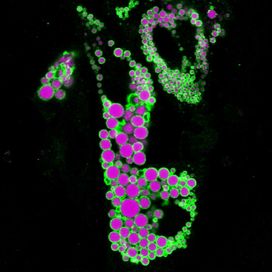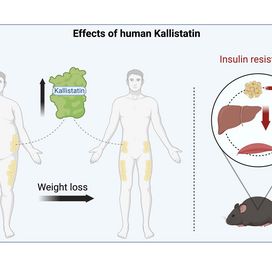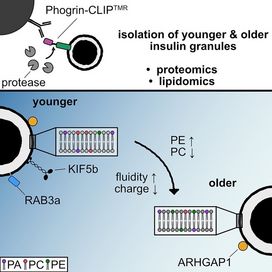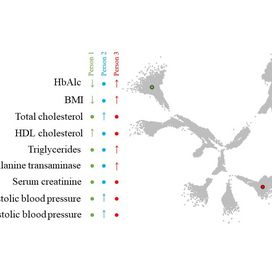
Potsdam-Rehbrücke, 12.07.2024
Blood Fat Profiles Confirm Health Benefits of Replacing Butter with High-Quality Plant Oils
Switching from a diet high in saturated animal fats to one rich in plant-based unsaturated fats affects the fat composition in the blood, which in turn influences long-term disease risk. A recent study published in 'Nature Medicine', conducted by a team of researchers from Chalmers University of Technology, Sweden, the German Institute of Human Nutrition, Germany, and several other universities, shows that it is possible to accurately measure diet-related fat changes in the blood and directly link them to the risk of developing cardiovascular disease and type 2 diabetes.
more
Potsdam-Rehbrücke / Tübingen, 10.07.2024
Metabolically Healthy Obesity: Fat Distribution Key to Assessing the Risk of Cardiovascular Disease
Obese but metabolically healthy people have a significantly lower risk of cardiovascular disease and death compared to metabolically unhealthy people with obesity. Unexpectedly, their risk is only slightly higher compared to lean, metabolically healthy people. A recent review article in 'Nature Reviews Endocrinology' by DZD researchers Matthias Schulze and Norbert Stefan shows that studies support the concept of metabolically healthy obesity (MHO) and emphasise the role of fat distribution. These findings are important for guiding treatment goals and intervention strategies in clinical practice.
more
Neuherberg, 08.07.2024
DZG Munich Day: Together Against Widespread Diseases
Research for health and the prevention and better treatment of widespread diseases are the goals of the German Centers for Health Research (DZG). At the DZG Munich Day on July 12, 2024, the eight DZGs will provide an overview of scientific highlights and an insight into joint research in Munich. Other focal points are the participation of patients and the presentation of poster awards.
more
Dresden, 04.07.2024
Researchers Identify Key Cells for Blood Sugar Control Using Optogenetics
How does our body control blood sugar so precisely? An international team led by Prof. Nikolay Ninov at the Center for Regenerative Therapies Dresden (CRTD), part of Dresden University of Technology, brought us a step closer to the answer. They found a special group of “first responder” cells in the pancreas that are crucial for triggering blood sugar response. Their findings were published in the journal Science Advances.
more
Potsdam-Rehbrücke, 01.07.2024
Heisenberg Professorship for DIfE Researcher Olga Ramich
On July 1, 2024, PD Dr. Olga Ramich was appointed professor jointly by the Charité – Universitätsmedizin Berlin and the German Institute of Human Nutrition Potsdam-Rehbrücke (DIfE). This is a professorship which is supported over five years by the coveted Heisenberg Program of the German Research Foundation (DFG). Ramich will then head the new “Molecular Metabolism and Precision Nutrition” department at the DIfE and research how the timing of food intake affects metabolism. Based on the knowledge gained from this research, new approaches to the treatment and prevention of nutrition-dependent metabolic diseases are to be developed.
more
Tübingen, 19.06.2024
Optimum Protection Against Diabetes: Weight Loss Plus Remission of Prediabetes
People with prediabetes are advised to reduce their weight in order to prevent manifest diabetes. Researchers from the Institute for Diabetes Research and Metabolic Diseases of Helmholtz Munich at the University of Tübingen, a partner in the German Center for Diabetes Research (DZD), together with US colleagues in the renowned “Diabetes Prevention Program (DPP),” have now been able to show for the first time that people achieve the best diabetes protection when they reduce their weight and at the same time normalize blood sugar regulation. In the specialist journal “Diabetologia,” the authors argue that the normalization of blood sugar levels in prediabetes should be included as a therapeutic goal in the guidelines in order to improve the prevention of type 2 diabetes.
more
Neuherberg, 05.06.2024
Father's Diet Before Conception Influences Children's Health
A recent study conducted by Helmholtz Munich and the German Center for Diabetes Research provides new insights into how fathers' diets and overweight can affect their children's health even before conception. The findings of the study can help develop preventive health measures for men wishing to become fathers: The healthier the father's diet, the lower the risk for their children to develop obesity or diseases such as diabetes later in life.
more
Cologne, 26.04.2024
Food in Sight? The Liver is Ready!
What happens in the body when we are hungry and see and smell food? A team of researchers at the Max Planck Institute for Metabolism Research has now been able to show in mice that adaptations in the liver mitochondria take place after only a few minutes. Stimulated by the activation of a group of nerve cells in the brain, the mitochondria of the liver cells change and prepare the liver for the adaptation of the sugar metabolism. The findings, published in the journal 'Science', could open up new avenues for the treatment of type 2 diabetes.
more
Dresden, 18.04.2024
Dr. Ingmar Schäfer Appointed as W2 Professor and Chair for Structural Membrane Biology at PLID and ZML in Dresden
Dr. Ingmar Schäfer has been appointed Professor and Chair of Structural Membrane Biology jointly at the Paul Langerhans Institute Dresden (PLID) and the Center of Membrane Biochemistry and Lipid Research (ZML), effective April 1, 2024.
more
Tübingen, 08.04.2024
Blood Glucose Control in the Intensive Care Unit: Differentiated Values for People With and Without Diabetes are Useful
Differentiating between people with and without diabetes can be useful for controlling and monitoring blood glucose levels in patients in the intensive care unit (ICU). This is the argument made by authors Andreas Birkenfeld, speaker of the German Center for Diabetes Research (DZD) and Medical Director of the Clinic for Diabetology, Endocrinology and Nephrology at Tübingen University Hospital, and Christian von Loeffelholz, Jena University Hospital, in an opinion piece in the specialist magazine ‘Lancet D&E’. They highlight the importance of individualized therapy regimens for ICU patients with diabetes but also point out the need for further detailed data and studies.
more
Neuherberg, 02.04.2024
Scientists Reveal Adipocyte's Metabolic Role and Identify Treatment Targets
Recent research underscores the critical role of adipocytes in storing fat, vital for organismal survival. Dysfunctional adipocytes can lead to metabolic disorders like type 2 diabetes and fatty liver disease, highlighting the importance of understanding lipid storage mechanisms. A team of scientists led by Helmholtz Munich have developed a novel approach merging proteomics with machine learning to map dynamic changes during adipogenesis. This method reveals new insights into protein regulation, offering potential targets for managing metabolic diseases.
more
Potsdam-Rehbrücke, 02.04.2024
DIfE Researcher Maximilian Kleinert Receives a Heisenberg Professorship
Since April 1, 2024, Dr. Maximilian Kleinert has held a Heisenberg professorship at the University Potsdam and headed the Department of Molecular Physiology of Exercise and Nutrition at the German Institute of Human Nutrition Potsdam-Rehbruecke (DIfE). A grant of over 600,000 euros funded by the Heisenberg Program of the German Research Foundation (DFG) allows Kleinert to research the molecular and genetic relationships between metabolism in skeletal muscle and metabolic diseases such as type 2 diabetes.
more
Tübingen, 15.03.2024
Kallistatin Contributes to the Beneficial Metabolic Effects of Weight Loss
After weight loss, people with overweight and obesity express more of the protein Kallistatin* in subcutaneous white adipose tissue. This was demonstrated by researchers from the DZD in a recent study. In addition, Kallistatin improves metabolism and could open up new therapeutic options for people with obesity and type 2 diabetes in future. The results have now been published in ‘Molecular Metabolism.’
more
Düsseldorf, 14.03.2024
Astonishing Conformity: Gompertz Law Predicts Mortality in Type 2 Diabetes
Researchers from the German Diabetes Center (DDZ) and the Robert Koch Institute have discovered a law for the relationship between mortality and age in people with diabetes: According to this law, mortality in people with diabetes in Germany constantly rises by 8.3% in males and 10.2% in females each year from the age of 30.
more
Dresden, 28.02.2024
New Insights into Proteomic and Lipidomic Changes During Insulin Granule Aging
Endocrine cells utilize secretory granules for the storage and regulated release of peptide- hormones and neurotransmitters - a process influenced by spatiotemporal factors like the proximity of these organelles to the plasma membrane and their age. While recent progress has been made, a comprehensive view about the molecular composition and aging-related changes of the insulin-containing secretory granules (ISGs) of pancreatic islet beta cells remains elusive. Now, new light was shed on the molecular composition of ISGs, which is relevant to better understand their behavior in healthy conditions and possibly in diabetes, in which insulin release is impaired. A team of researchers from the Paul Langerhans Institute Dresden (PLID) of the German Center for Diabetes Research, the Center of Membrane Biochemistry and Lipid Research at TU Dresden, the Max Planck Institutes for Biochemistry and Medical Research, respectively, as well as the Center for Molecular and Cellular Bioengineering have unveiled a novel immunobased approach for the purification of ISGs. Published in renowned Journal “Cell Reports”, this refined protocol enabled for the first time the accurate proteomic and lipidomic profiling of age-distinct ISG pools.
moreTübingen, 26.02.2024
New Insights into Human Brain Development
The development of the human brain is a key factor in mental health. Already in the early stages of life, the way in which the brain receives and processes signals and information changes significantly at different stages of development. Impaired development can have lasting consequences and lead to mental disorders. Together with international research partners, researchers at the University Hospital Tübingen have gained some enlightening insights: The neural complexity of brain activity changes differently than expected between the late stage of pregnancy and early childhood and, moreover, with sex-specific differences. These findings have now been published in the prestigious journal ‘Nature Mental Health’.
more
Neuherberg, 28.02.2024
Rising Focus on 'Inceptor' as a Type 2 Diabetes Therapeutic Target
Research targeting the insulin-inhibitory receptor, called inceptor, unveils promising avenues for beta cell protection, offering hope for causal diabetes therapy. A novel study in mice with diet-induced obesity demonstrates that the knock-out of inceptor enhances glucose regulation, prompting its further exploration as a drug target for type 2 diabetes treatment. These findings, led by Helmholtz Munich in collaboration with the German Center for Diabetes Research, the Technical University of Munich, and the Ludwig-Maximilians-University Munich, drive advancements in diabetes research.
more
Potsdam-Rehbrücke, 29.01.2024
Metformin During Pregnancy Impacts Offspring Brain Development
With the rise in gestational diabetes and metabolic disorders during pregnancy, metformin is also being prescribed more frequently. Although it is known that the oral antidiabetic agent can cross the placental barrier, the impacts on the brain development of the child are largely unknown. An interdisciplinary research team from the German Institute of Human Nutrition Potsdam-Rehbrücke (DIfE) have now been able to demonstrate in a mouse model that although metformin has positive effects in pregnant animals, it does not in the offspring. The results were published in the specialist journal ‘Molecular Metabolism’.
more
Düsseldorf, 23.01.2024
DDZ Study with Innovative Insights into the Heterogeneity of Type 2 Diabetes
A landmark study by the German Diabetes Center (DDZ), published in ‘The Lancet Diabetes & Endocrinology’, sheds new light on the heterogeneity of type 2 diabetes. The researchers employed an innovative algorithm to stratify people with type 2 diabetes using routine data and thus visualize the metabolic diversity of diabetes.
more
Neuherberg, 12.01.2024
Metabolic Diseases: How Immune Cells Regulate Tissue Function
A recent discovery led by Helmholtz Munich researchers from the Type 1 Diabetes Immunology Research Unit has uncovered how regulatory immune T-cells (called Tregs) interplay and control metabolic tissues. The new findings published in 'Cell Metabolism', give crucial insights into the prevention and regulation of metabolic diseases, such as obesity and type 2 diabetes.
more
Düsseldorf, 09.01.2024
A New DDZ Study Provides Systematic Evidence for the First Time: Different Diets are Effective in the Management of Type 2 Diabetes
A major new study by the German Diabetes Center (DDZ) has evaluated the effect of diet on the management of type 2 diabetes and the prevention of complications. The review shows the positive effects of different diets (plant-based, Mediterranean, low-carbohydrate, high-protein) on cardiometabolic health in individuals with type 2 diabetes.
morePress contact

Birgit Niesing
niesing(at)dzd-ev.de
+49 (0)89 3187-3971
